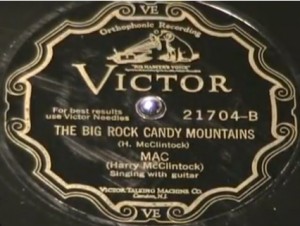The lyrics were bowdlerized in 1949 by Burl Ives to make it suitable for children (the “cigarette trees” became “peppermint trees”), which is how many people know it today. But in its “original” form, it was substantially darker. It’s a tale spun about a hobo’s paradise, where cigarettes grow on trees, lakes are filled with liquor, jails are made of easily-broken tin, and the police are too disabled to chase those caught breaking the law … as hobos routinely did. The story is being told by an adult hobo trying to lure a boy to go with him; the rarely-sung closing verse reveals that the hobo wants the boy for sexual purposes.
Particularly in its original version, it’s an important piece of Americana, as demonstrated by its inclusion – presumably with royalties paid to someone (McClintock died in 1957) – in the 2000 film “O Brother, Where Art Thou?”
Listen to “The Big Rock Candy Mountain”.


